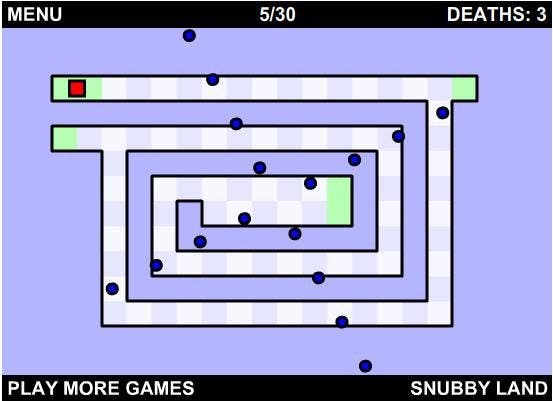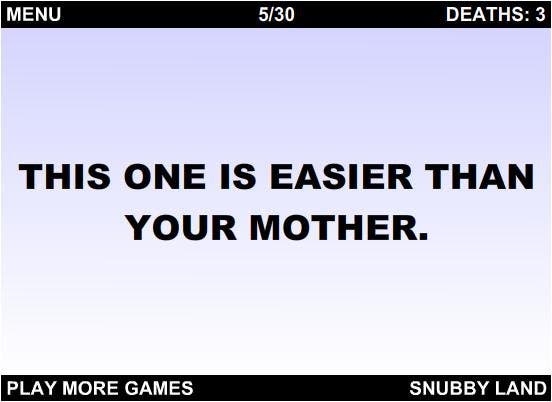What makes games frustrating?
And what makes us keep playing?
There's something pleasing about committing so much time to a worthless endeavour. It's an act of satisfaction that's relevant to you and you alone. In the origins of gaming this simplicity was a necessity, given the limitations of the hardware, but it fulfilled a primal craving that will never disappear, no matter how much superficial gloss we paint on template genres.
I once considered this genre of gaming to belong to a darker age - one I thought was thankfully forgotten. I've now taken to collecting examples of it like most people stash porn.
The revival of this approach to game development has been a call to arms for indie developers. Accessible and affordable, they provide the perfect vehicle for a fledgling studio to make its mark on the industry. In this regard, gaming is simply coming full-circle.

However, there's a fine line between success and failure here. Precisely where that line is drawn ultimately comes down to personal opinion. But here are my recommendations for the rules great frustration gaming:
Rule 1 - Keep it simple. The objective needs to be clear and unambiguous with the end, or at least some progress, clearly in sight. If you're going to surprise the player with a fiery death immediately after overcoming an obstacle, make sure there's a clue in there he or she really should have noticed.
Rule 2 - Don't cheat the player. Hypnosis doesn't work when the watch swings into the side of your face. If the controls aren't tighter than a screw, re-work them.
Rule 3 - Provide timely checkpoints.
Rule 4 - Make me laugh at myself. Voluntary submission to self-flagellation requires a certain amount of brevity thrown into the mix. I don't mind feeling stupid, as long as I can feel I'll get smarter with just one more go.

For me, these factors make the difference between a game that frustrates and challenges in equal measure and one that gets switched off, discarded and resented. Once that line has been crossed, only perfection will suffice. Anything less becomes a curse on the player. Only third-party peripheral makers get a kick out of bad frustration gaming.
If you want an example of what happens when things go right check out the World's Hardest Game, a title which has rapidly become the brightest gem in my sordid collection. Reckon the mainstream transformation of gaming has led to a dumbing-down of difficulty? Long for the days when you sat hunched over a PC, sweating and close to tears, for hours on end? Armor Games would like to know if you're sure about that. Really, really sure.
Released in 2008, it's by no means a new game, but it meets the requirements for pure frustration gaming better than many I've played. World's Hardest Game wears its aneurism-inducing credentials like a badge of honour. The objective is simple - guide a red square past the blue circles to a green area, while the developer taunts you between levels.
Success is measured simply in terms of how many deaths you accrue through the game's 30 levels. Looking at the leaderboards, I find myself feeling real compassion for those who have finished the game without incurring a single death. Those who like their games to test their patience as much as their reflexes should really give it a go.
And then, just one more go.








